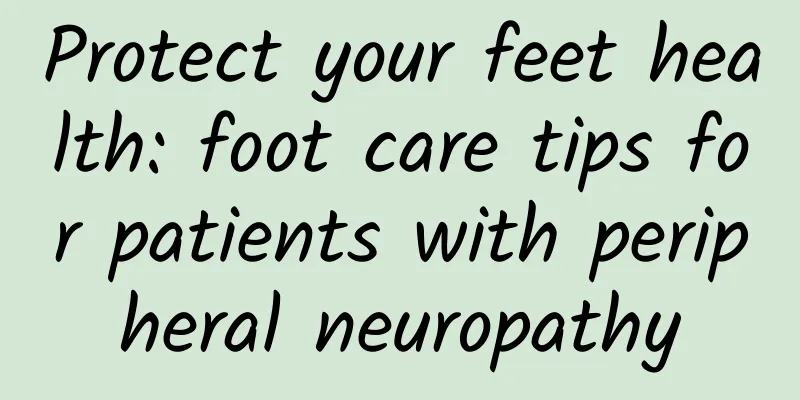Protect your feet health: foot care tips for patients with peripheral neuropathy

|
Author: Zheng Yongsheng, Xu Yafang, Zhang Mingjie, Sun Chong, Huashan Hospital Affiliated to Fudan University Reviewer: Lin Jie, deputy chief physician, Huashan Hospital, Fudan University Foot care is an important part of the daily life of patients with peripheral neuropathy. Without careful observation and proper care, patients may develop foot problems such as pressure sores and ulcers due to changes in blood circulation and decreased sensation caused by peripheral neuropathy, and in severe cases, may even lead to serious consequences due to infection. For patients with peripheral neuropathy, the following care points should be noted: Figure 1 Copyright image, no permission to reprint 1. The shoes worn by the patient should fully cover the toes and support the sole and arch of the foot. There should be about 1.2 cm (equivalent to the width of a thumb) of space at the front of the shoe. The upper should be soft and flexible, with a smooth lining, no wrinkles and obvious seams. Figure 2 Copyright image, no permission to reprint 2. Avoid walking barefoot as much as possible. If it is unavoidable, carefully check your toes and soles for injuries after walking, especially after walking barefoot outdoors. Figure 3 Copyright image, no permission to reprint 3. Foot soaking can promote blood circulation in the feet, but patients with reduced sensation need to test the water temperature before soaking to prevent burns. After soaking, the feet should be dried in time, especially between the toes, to avoid water retention. 4. For hard or dry areas of the feet, you can use oils such as coconut oil, jojoba oil or shea butter to keep the skin moisturized, but avoid using it between the toes. 5. Change your socks at least once a day, preferably cotton. Wear cushioning and sweat-absorbing insoles in your shoes. Check your socks daily for blood or other discharge, which could be a sign of an unnoticed wound or ulcer. Figure 4 Copyright image, no permission to reprint 6. Keep your nails flat and ask your family for help when trimming them to reduce the risk of injury. 7. Corns and calluses on the feet are manifestations of excessive local pressure. You should check whether your shoes fit your feet and pay attention to reducing pressure. To keep warm, you can cover yourself with a blanket or wear warm soft boots, and avoid using hot water bottles to prevent burns. 8. Pay attention to whether the sock opening is too tight. When your calves are swollen, too tight sock openings may hinder blood circulation and aggravate swelling. 9. Do not smoke. Smoking can cause vasoconstriction and reduce blood supply to the feet. Figure 5 Copyright image, no permission to reprint 10. Avoid crossing your legs to avoid reducing blood supply to your legs. Regular walking can help improve blood circulation in your legs. 11. Minimize the use of tape on your feet to reduce the risk of skin damage. Check your feet and the skin between your toes every day. You can use a mirror to help you observe. You can also ask your family or friends to help you check. If you find painless ulcers, cuts, red spots, edema, pus or blisters, you should see a doctor immediately. |
<<: In addition to statins, what other drugs can reduce the risk of atherosclerosis?
>>: Time is an old naughty boy, sitting firmly on the "tumbler"
Recommend
How many days do you need to rest after a medical abortion?
Abortion, I believe no one wants to hear the word...
Is it normal to have occasional abdominal pain during early pregnancy?
Pregnancy is the happiest moment in every woman&#...
Why are Premier League games more interesting? Why is the Premier League called the world's best league?
The Premier League has a large audience and a wid...
What can I eat to get rid of uterine cold?
The uterus is one of the most important parts of ...
What are the solutions for athlete’s foot during breastfeeding?
Athlete's foot is very common in life, especi...
What to do if your breasts are too big or too small
The nutritional value of breast milk is very high...
What should women do about menopausal syndrome?
Menopause is a stage in life that women must go t...
How to treat vaginal bleeding during pregnancy
Pregnant women must be well equipped, get enough ...
Is it best to have sex one week after your period ends?
Women have regular menstrual periods about once a...
What should I do if my nipple hurts when my baby sucks it?
When feeding the baby, mothers often experience p...
5 weeks pregnant?
Pregnancy is something that women need to activel...
What to do if a female urethra has a fleshy pimple
Recently, many friends have developed fleshy lump...
Why is stinky tofu black? The harm of stinky tofu
Street food is a kind of food that is very enjoya...
What is the reason for the endometrium not growing?
A woman's endometrium is very magical. It cha...









